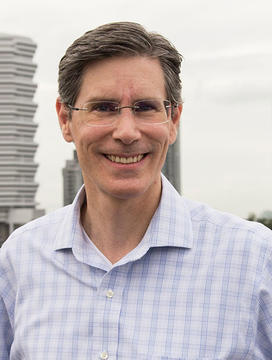Robert Kraybill ’89 Uses High Finance to Empower Women

Thus has said many a Princeton graduate entering the heady world of high finance, including Robert Kraybill ’89, a former banker at Wasserstein Perella in New York and, later, Dresdner Kleinwort Wasserstein in Singapore.
“I’m not sure if I 100 percent believed that, but I, at least, subscribed to that to a large extent,” Kraybill says of the financial industry.
Plus, Kraybill enjoyed reading about the deals he brokered in the newspaper. The work certainly made Kraybill — who had grown up in the small town of Brigantine, N.J. — feel like he was leaving his mark on the world.
Then the financial crisis of 2008 hit, and Kraybill, who by that time was working for hedge fund Marathon Asset Management, says he realized that while the work of financiers like him might lead to the efficient allocation of capital in some cases, “that certainly wasn’t the conscious goal of most people working in financial markets.”
“And as the financial crisis made clear, that was not always the outcome either,” Kraybill says.
That’s when Kraybill decided he no longer wanted to wait for the market’s “invisible hand” to work. Instead, he would start consciously channeling capital to organizations he deemed good for the environment, good for women’s empowerment and good for society. In other words, Kraybill wanted to change the financial system from the inside.
Colleagues had one of three reactions when they heard of Kraybill’s new mission: You’re crazy; that’s very noble, but you’re still crazy; and how can I help?
He found one of those last, willing partners in his wife, Durreen Shahnaz.
The couple had met on their first day as young analysts at Morgan Stanley, both about 10 minutes late for a welcome assembly with the bank’s president. Riding up the elevator to the assembly that day in a bit of panic, they sneaked in the back together only to realize that the last remaining seats were in the front row.
“Having to walk up and sit down as the president was making his welcome speech, that was a little bit of a bonding-under-fire experience,” Kraybill says.
Some 20 years later, they faced the prospect of something perhaps even more harrowing — persuading the financial world that it could make money and expressly do good for society at the same time.
But while Kraybill had pursued traditional investment banking after Morgan Stanley, Shahnaz had already made a career, at Grameen Bank and elsewhere, of trying to lend money to small-time entrepreneurs in developing countries. She knew how difficult it was for these business owners — especially women — to tap financial markets for larger sums and she knew what was needed to correct the situation.
In 2009, with the help of a grant from the Rockefeller Foundation, Kraybill and Shahnaz created Impact Investment Exchange (IIX). They hoped to create an exchange dedicated to listing the stocks and bonds of, in Kraybill’s words, “mission-driven social enterprises” — businesses that are similarly dedicated to doing some kind of good as opposed to simply making money. It’s an idea that Kraybill admits is still “ahead of its time.”
So IIX started consulting for social enterprises as well, helping businesses like ATEC Biodigesters quantify the “impact” of its work in Cambodia beyond dollars and cents. In ATEC’s case, the company’s biodigesters, which convert manure into cooking gas, eliminate the need for wood- and dung-burning fires in the kitchens of poor farmers. That not only saves these households the cost of firewood, but also helps prevent deforestation and leads to improved health and reduced carbon emissions, Kraybill says. IIX sought to quantify that.
IIX also created an online platform, called Impact Partners, where qualified angel investors would be able to find and give money to startup social enterprises.
“If you increase the income of women in the household, that money tends to get used to fund things like children’s education, better nutrition for the family, and in a way that improves lives in the community.”
Robert Kraybill ’89
But to really expand their reach and appeal to larger investors, Kraybill and Shahnaz decided they needed to create a new financial instrument that allowed investors to pour money into a broader range of businesses more easily.
“If we’re raising capital on the Impact Partners platform, a typical deal size for us there might be $1 million or so,” Kraybill says. “We’ll work quite hard on a transaction to raise $1 million for a company, which can be very satisfying. But we thought, ‘Well, is there a way we can actually work on a transaction where we raise $10 million or $20 million or $30 million in a single transaction and use that funding to fund not just one enterprise, but a whole portfolio of enterprises?’”
They came up with the idea for a bond, the Women’s Livelihood Bond series, through which they eventually hope to raise $150 million. In 2017, IIX closed the first bond in the series, raising $8 million. In January, IIX closed the second bond in the series, raising $12 million.
The bond proceeds will go toward funding companies like Amru Rice, which works in Cambodia with small-time farmers, the majority of whom are women, to get their rice certified as organic, allowing them to sell the rice at a premium.
“If you increase the income of women in the household, that money tends to get used to fund things like children’s education, better nutrition for the family, and in a way that improves lives in the community,” Kraybill says.
IIX’s work has won the acclaim of the United Nations, from which it received a 2019 U.N. Global Climate Action Award.
But the former investment banker no longer measures his “impact” on the world in the newspaper headlines his transactions receive.
“I use the term ‘impact’ differently now in my current career,” Kraybill says.











No responses yet